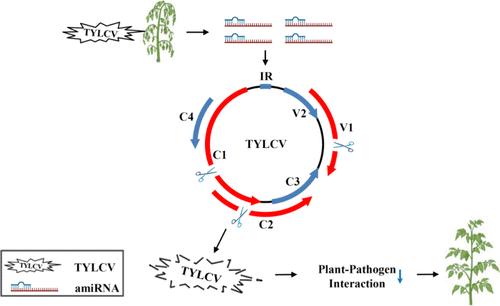AmiRNA 技术通过抑制 TYLCV 复制来抑制植物与病原体的相互作用途径,从而增强番茄的抗病性
IF 5.7
1区 农林科学
Q1 AGRICULTURE, MULTIDISCIPLINARY
引用次数: 0
摘要
番茄黄化曲叶病毒病严重威胁着番茄的品质和产量。本研究探讨了amiRNA技术在番茄(樱桃番茄和大果番茄)抗病中的作用,并分析了转基因植株抗病的生理和分子机制。TYLCV含有6个功能基因,其中C1、C2和V1基因具有较多的磷酸化位点和糖基化位点,蛋白质结构较为复杂。在所有分别沉默了 C1、C2 和 V1 基因的转基因樱桃番茄(J6)植株中,病毒复制受到抑制,膜脂过氧化程度降低,抗病性增强。同样,沉默 C1 基因也增强了大果番茄的抗病性。总之,amiRNA 技术能阻碍病毒复制,从而降低番茄植物与病原体相互作用途径的活性,削弱番茄与病毒之间的相互作用,从而提高抗病性。本文章由计算机程序翻译,如有差异,请以英文原文为准。

AmiRNA Technology Enhances Tomato Disease Resistance by Suppressing Plant-Pathogen Interaction Pathways through Inhibiting TYLCV Replication
Tomato yellow leaf curl virus disease has seriously threatened the quality and yield of tomatoes. In this study, we investigated the role of amiRNA technology in disease resistance in tomatoes (cherry tomato and large-fruited tomato) and analyzed the physiological and molecular mechanisms of disease resistance in transgenic plants. TYLCV contains six functional genes, of which the C1, C2, and V1 genes have more phosphorylation sites and glycosylation sites, and the protein structure is more complex. The virus replication was inhibited, the peroxidation of membrane lipids was reduced, and disease resistance was enhanced in all transgenic cherry tomato (J6) plants in which the C1, C2, and V1 genes were silenced, respectively. Similarly, silencing of the C1 gene enhanced disease resistance in large-fruited tomatoes. In conclusion, amiRNA technology hinders viral replication, leading to reduced activity of the tomato plant-pathogen interaction pathway and weakening tomato-virus interactions, thereby improving disease resistance.
求助全文
通过发布文献求助,成功后即可免费获取论文全文。
去求助
来源期刊
CiteScore
9.90
自引率
8.20%
发文量
1375
审稿时长
2.3 months
期刊介绍:
The Journal of Agricultural and Food Chemistry publishes high-quality, cutting edge original research representing complete studies and research advances dealing with the chemistry and biochemistry of agriculture and food. The Journal also encourages papers with chemistry and/or biochemistry as a major component combined with biological/sensory/nutritional/toxicological evaluation related to agriculture and/or food.

 求助内容:
求助内容: 应助结果提醒方式:
应助结果提醒方式:


